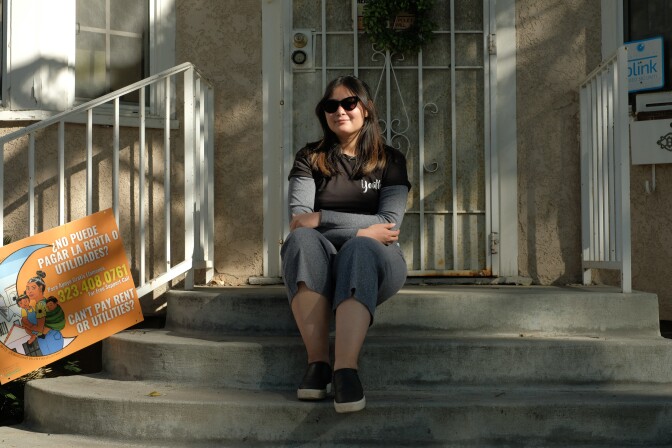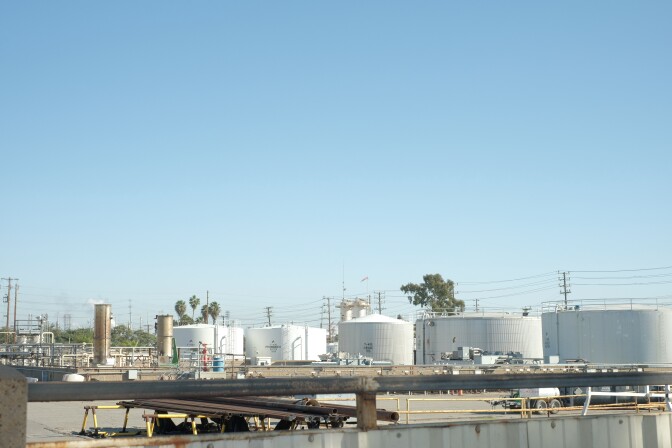This story is free to read because readers choose to support LAist. If you find value in independent local reporting, make a donation to power our newsroom today.
No More New Oil And Gas Drilling For LA

The L.A. City Council unanimously voted on Wednesday in favor of banning new oil and gas drilling and beginning the process of completely phasing out existing oil and gas production within city limits over the next 20 years.
For communities who have lived for generations on the front line of oil extraction, the vote is a major win. Ashley Hernandez grew up in Wilmington, one of the most heavily polluted neighborhoods in L.A. Her home is across the street from the Little League baseball field. It’s also just steps away from Warren E&P, one of the largest oil drilling operations on the west coast.
As a kid, she had regular nosebleeds and eye infections. Many of her classmates had asthma and used inhalers. Cancer was all too common in her community.
“That's life in Wilmington to be honest,” Hernandez said. “My first memory of this community was watching my mom from my bed using a nebulizer, and I had never seen that in my life. But when we moved here, it was the first time she had to use that.”

For decades, communities living near oil wells in L.A. have sounded the alarm about the pollution and health impacts of drilling in their neighborhoods. They've also had to cope with other impacts of these drilling sites: constant truck noise, strange smells and unexplained booms that shake houses and crack walls, Hernandez said.
A recent USC study of two drilling sites in south L.A. provided only more confirmation of the health impacts of neighborhood drilling. It found that many people who live near drill sites can have lung damage similar to daily exposure to secondhand smoke or living beside a freeway. Many of the communities near drill sites are also near freeways and industrial facilities, so the threats to community health are multiplied.
Phasing Out Oil And Gas
The city of L.A. has the largest concentration of urban oil fields in the nation, but only contributes about 2% of California’s total oil production. More than a third of Angelenos live less than a quarter mile from an active oil well and there are more than 5,000 active or idle wells across L.A., according to the city’s Planning Department.
The council’s vote declares urban drilling a non-conforming land use and directs the city’s planning department to draft an ordinance to ban new oil and gas extraction. It also begins a process to phase out all existing oil and gas operations in the city over the next 20 years.
😭😭😭
— California Environmental Justice Alliance (@cejapower) January 26, 2022
👏👏👏👏👏👏👏👏👏
This is people power y’all. Huge congratulations to @STAND_LA @CBECal @PSRLA @EsperanzaCHC - and so many more. #NoMoreDrilling https://t.co/8q9cJ5f00c
Before the phase-out starts, however, the city will request a study on how to decommission existing oil fields and how oil companies can recoup their investments. The council will also have to vote on revisions to the city’s zoning code.
Proposed changes will go before the city council for a vote at a later date.
The oil and gas industry has pushed back against these changes, arguing that job loss will hurt workers who are often from the communities where the most oil infrastructure is.
In response to these concerns, Council President Nury Martinez announced a motion to form a task force to support oil and gas workers in the transition away from fossil fuels.
Growing Momentum
The efforts are part of growing momentum across California to unhook from planet-heating energy sources, like oil and gas, as cities and the state aim to lead the nation in efforts to combat the climate crisis.
In September last year, the Los Angeles County Board of Supervisors voted to ban new oil and gas wells and phase out existing wells in unincorporated areas. Last summer, Culver City also voted in favor of a phaseout.
Last October, Gov. Gavin Newsom visited Wilmington to announce draft regulations that will require new oil wells and drilling facilities across the state to be at least 3,200 feet from homes, schools, hospitals and nursing homes. Those rules would also require existing oil and gas facilities to have greater pollution controls if they are within those 3,200 feet.

The vast majority of oil operations in L.A. are in communities of color, who have for decades fought against environmental racism. The vote is something to celebrate for Hernandez and she hopes it will push the state to do more to shut down oil and gas extraction and transition to a cleaner and more equitable economy. But Hernandez said she and the coalition of groups who pushed for this change are already preparing for fights still to come.
“We're making history as a community of color, as a community that a lot of people don't like to consider a lot of times,” Hernandez said. “We're doing something incredible, and I know that our efforts are not going to stop at this vote. This is for the future of our communities.”








